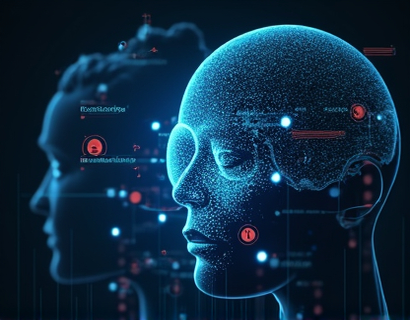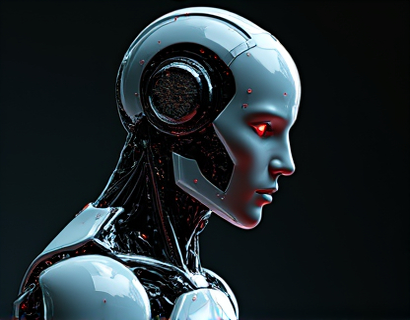AI-Powered Knowledge Interface: Transforming Learning for Professionals, Students, and All
The advent of AI-powered knowledge interfaces has revolutionized the way professionals, students, and learners of all ages access and interact with specialized insights and educational content. These cutting-edge platforms leverage artificial intelligence to deliver accurate, verified, and safe information, catering to diverse needs and ensuring a secure learning environment. This article delves into the features and benefits of such platforms, focusing on their applications for professionals, students, and educational institutions, while emphasizing the importance of content verification and child-friendly versions for safe and enriching learning experiences.
Enhancing Professional Development with AI
For professionals, staying updated with the latest industry trends, best practices, and technological advancements is crucial. An AI-powered knowledge interface can serve as an invaluable tool in this regard. By interacting with an AI chat platform, professionals can receive specialized insights tailored to their specific fields, whether it's healthcare, finance, technology, or any other industry. This not only saves time but also ensures that the information is up-to-date and relevant.
The AI chat platform can be designed to understand complex queries and provide detailed responses, making it an efficient resource for continuous learning and professional growth. For instance, a medical professional can ask about the latest research findings, treatment protocols, or regulatory changes, and receive comprehensive answers backed by credible sources. This level of specialized knowledge is typically difficult to access through traditional means, making AI-powered interfaces a game-changer in professional development.
Educational Excellence for Students
Students, from elementary to higher education, can greatly benefit from AI-powered knowledge interfaces. These platforms can offer personalized learning experiences, adapting to the individual needs and learning paces of each student. For students, the AI chat can be a virtual tutor, providing explanations, examples, and additional resources on various subjects. This personalized approach can help bridge knowledge gaps and enhance understanding, leading to better academic performance.
Moreover, the AI can be programmed to align with educational standards and curricula, ensuring that the content is not only accurate but also relevant to the students' current studies. This makes it an excellent supplementary tool for teachers and educators, who can use the AI to supplement their teaching and provide extra support to students who need it.
Ensuring Safe and Reliable Learning
One of the most significant advantages of AI-powered knowledge interfaces is their ability to verify the accuracy and reliability of the information provided. In an era where misinformation can spread rapidly, having a trusted source of knowledge is invaluable. The AI can cross-reference information from multiple credible sources, ensuring that users receive accurate and up-to-date content. This feature is particularly important for professionals and students who rely on precise information for their work and studies.
Additionally, the platform can implement strict content moderation policies to prevent the dissemination of harmful or inappropriate content. This is especially crucial for younger users, ensuring that the learning environment remains safe and conducive to education. By combining advanced AI algorithms with human oversight, these platforms can maintain high standards of content quality and safety.
Child-Friendly Learning Experiences
For parents and educators, the safety and appropriateness of online learning tools are paramount. An AI-powered knowledge interface can offer a child-friendly version of its services, designed specifically to cater to the needs of young learners. This version can include simplified language, engaging visuals, and interactive elements that make learning fun and accessible for children.
The child-friendly version can also incorporate parental controls and monitoring features, allowing parents to oversee their children's learning activities and ensure they are accessing age-appropriate content. This not only enhances the learning experience but also provides peace of mind for parents, knowing that their children are learning in a secure and controlled environment.
Benefits for Educational Institutions
Educational institutions, including schools and universities, can greatly benefit from integrating AI-powered knowledge interfaces into their curricula. These platforms can serve as comprehensive resources for both students and faculty, providing access to a wide range of specialized content and tools. For educators, the AI can be a valuable resource for lesson planning, offering insights into the latest teaching methodologies and educational technologies.
Moreover, the AI can facilitate collaborative learning by connecting students and teachers from different parts of the world, fostering a global learning community. This can enrich the educational experience, exposing students to diverse perspectives and cultural insights. The AI can also help in assessing student performance and identifying areas where additional support is needed, enabling more targeted and effective teaching strategies.
Interactive and Engaging Learning
One of the key features of AI-powered knowledge interfaces is their ability to create interactive and engaging learning experiences. Through natural language processing and machine learning, the AI can understand user queries and provide dynamic, context-aware responses. This interactivity can make learning more engaging and enjoyable, encouraging users to explore topics in greater depth.
For example, a student asking about a complex scientific concept can receive a step-by-step explanation, accompanied by diagrams and simulations. Similarly, a professional seeking insights on a specific industry trend can get a detailed analysis, complete with data visualizations and expert opinions. This level of interactivity not only enhances understanding but also keeps users engaged, making the learning process more effective.
Continuous Improvement and Adaptation
AI-powered knowledge interfaces are not static; they continuously learn and adapt based on user interactions and feedback. This means that the quality and relevance of the content can improve over time, staying ahead of the curve in terms of accuracy and usefulness. The AI can analyze user queries and feedback to identify common gaps in knowledge or areas where users seek more information, allowing the platform to prioritize content development in these areas.
Furthermore, the AI can integrate with other educational tools and resources, creating a seamless and comprehensive learning ecosystem. For instance, it can connect with online libraries, academic journals, and other reputable sources to provide a rich and varied content library. This integration ensures that users have access to a wide range of materials, enhancing the depth and breadth of their learning experiences.
Conclusion
AI-powered knowledge interfaces represent a significant advancement in the field of education and professional development. By providing accurate, verified, and safe content, these platforms cater to the diverse needs of professionals, students, and educational institutions. The child-friendly versions ensure that learning remains safe and enriching for young users, while the interactive and adaptive features enhance the overall learning experience.
As technology continues to evolve, the potential for AI in education and professional growth is vast. These platforms not only facilitate access to specialized insights but also foster a culture of continuous learning and innovation. By embracing AI-powered knowledge interfaces, individuals and institutions can stay ahead in an ever-changing world, equipped with the knowledge and skills needed to succeed.










































